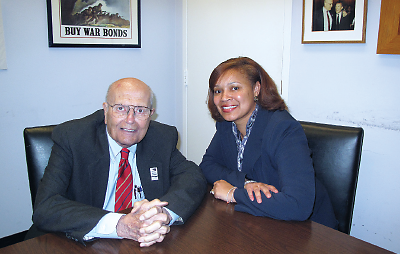Don’t let the unpretentious manner of this young, soft-spoken psychiatrist from Stamps, Ark., fool you. Rhonda Mattox, M.D., has big ambitions. “I’m going to be the first psychiatrist surgeon general of the United States,” she declared in an interview with Psychiatric News.
Former Surgeon General David Satcher M.D., Ph.D., although not a psychiatrist, has long been associated with mental health issues, she noted. “He issued the first surgeon general’s report on the topic of mental health and mental illness and underscored that mental health is fundamental to our nation’s overall health.”
At first glance, Mattox’s ambition may seem a bit unrealistic, but when in light of what she has been doing professionally during the last year, the goal doesn’t seem out of reach. She has been working as an APA Jeanne Spurlock, M.D., Congressional Fellow in the office of Rep. John Dingell (D-Mich.), dean of the House of Representatives and a key author of the Affordable Care Act.
“Rhonda has made a very valuable contribution to what we have done here,” Dingell told Psychiatric News on January 17—two days before Mattox completed her fellowship with him. “We are sorry to see her go! She’ll be a better-skilled person from what she tells me she has learned here.”
During her fellowship, Mattox advised Dingell and his staff on policy issues relating to the Affordable Care Act; worked on repealing the much-derided sustainable growth rate component of the Medicare payment formula; briefed Dingell on health-policy issues prior to hearings of the Energy and Commerce Subcommittee on Health; and compiled “The ABCs of Navigating the Affordable Care Act: A Resource Guide to Understanding Your Rights, Responsibilities, and Choices”—a 60-page document for residents of Dingell’s home state.
“I have learned that it takes a village to get things done on Capitol Hill,” she observed, “that everyone is valuable, from the interns to the scheduler to the person who picks up the trash. I have learned that you need to be humble and ask for information from the people who have the expertise.”
Experiences a Far Cry From Civics Class
There were certainly a number of surprises, she admitted. “What you see on the Hill is not what you read about in civics class. You see the best coming out of people, but also the worst coming out of them, and that can be disappointing. I witnessed how cumbersome it could sometimes be to get something done and how vindictive some people could be in terms of the government shutdown last fall.”
Nor is Capitol Hill immune to mental health tragedies, she discovered. During the partial government shutdown, a woman who appeared to be psychotic was shot near the Capitol because “people were on high alert and very protective. She seemed like a threat, so she was killed. That was hard for me,” she said.
On a more positive note, Mattox was being courted with job offers even before her fellowship ended in January. “People wanted to fly from Arkansas to Washington, D.C., to meet with me and interview me for job opportunities—for instance, for the Division of Behavioral Health Services for the state of Arkansas. I was also encouraged to become medical director of the Arkansas Minority Health Commission.”
She decided that she would continue as medical director of United Family Services in Little Rock—a position she held before her fellowship—but she has also been retained by the Arkansas Minority Health Commission as its medical media consultant. In that capacity, she will host a radio show, “Ask the Doctor,” be a television and radio spokesperson on minority health care disparities, and develop a statewide media campaign to reduce mental health stigma.
No Stranger to Media Strategies
She had already had extensive experience in media education efforts, she explained. For example, while a psychiatry resident at the University of Arkansas, she worked on a bilingual statewide educational campaign to reduce stigma associated with depression during and after pregnancy.
She appeared in a television suicide-prevention ad. What she said in the ad was basically this: “My name is Rhonda Mattox. I am not an actor, but a psychiatrist. When my mother was pregnant with me, she had such a severe depression she attempted suicide. I am now devoting my life to helping others prevent the tragedy of suicide.” The ad stimulated a statewide dialogue about the effects of depression, she said.
While she was living in Los Angeles a few years ago, she collaborated with Hollywood, Health, and Services, a program at the University of Southern California that provides entertainment industry professionals with accurate and timely health information for story lines. She worked with writers from “ER,” “90210,” and other popular television shows to help them depict mental illness accurately.
“The work I am most proud of was with the popular teen drama ‘90210,’ ” she said. “I worked with the writers and producers to create an educational and entertaining story line that spanned six episodes and that concerned a major character with bipolar disorder. I was thrilled when the writers and producers got a VOICE Award for the episode that aired on April 7, 2009, and was viewed by over 2 million people. The VOICE Awards recognize television and film writers and producers who have given a voice to people with behavioral health problems by incorporating dignified, respectful, and accurate portrayals of these individuals into their scripts, programs, and productions.”
When can we look forward to Mattox exerting even more public clout—that is, becoming the U.S. surgeon general? “Who knows? During the next five or 10 years,” she estimates.
Mattox strongly encourages her colleagues to apply for the fellowship. “It gives you an insider’s look at Capitol Hill,” she emphasized. “The relationships you make are invaluable for a number of reasons, and not just because of job opportunities. You meet people who are experts in other fields, and they bring a lot of depth and experience. The fellowship also helps you understand how to get things done on a policy level to advance patient health care,” she said.
“It’s a once-in-a-lifetime opportunity to influence national policy for your patients.”
In a video interview, Rhonda Mattox, M.D., discusses several of the lessons she has learned from her APA Jeanne Spurlock, M.D., Congressional Fellowship. The interview can be viewed,
here. For information about applying for a Jeanne Spurlock, M.D., Congressional Fellowship, contact Marilyn King in the APA Division of Diversity and Health Equity at (703) 907-8653 or
[email protected].

